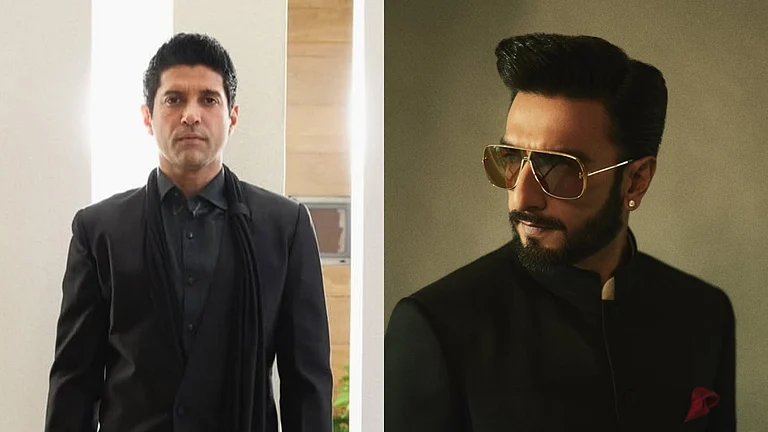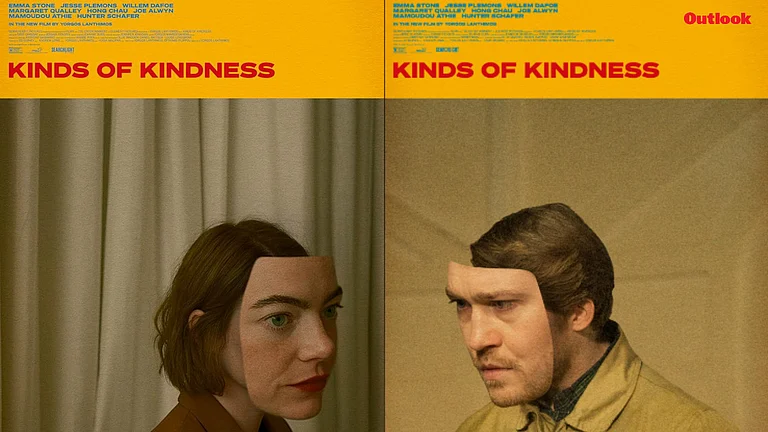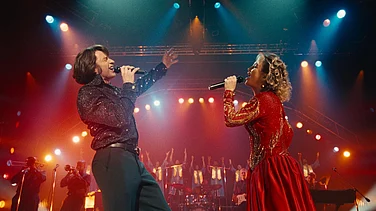
Yorgos Lanthimos reunites with Emma Stone for their fifth film together, Bugonia
Jesse Plemons, who starred alongside Stone in Lanthimos' previous, Kinds of Kindness, returns as a lead
Stone plays a CEO who gets kidnapped by Plemons' conspiracy nut and beekeeper
In Yorgos Lanthimos’ Bugonia, his fifth film with Emma Stone, the trademark macabre, madcap cheekiness gets swapped for something disappointingly milder. Save for few final all-out flings, Lanthimos keeps it reined in. There are stabs here too at acidic irony but it’s doused within a banal vocabulary. Everything is pitched at a comparatively lower key than the familiar, despite simmering unease. On all counts, Bugonia feels like a slight entry—something made in a scurry before a massive leap. At worst, it’s slapdash, overly reliant on a formidable Stone and a precisely variegated Plemons, both lugging it forth with electric synergy. Stone essays a pharmaceutical company CEO, Michelle Fuller, who gets kidnapped by Teddy (Jesse Plemons) and his autistic cousin, Donny (Aidan Delbis). The mastermind, Teddy works a menial job for Michelle’s company and has spent too much time fiddling with conspiracy theories online instead of tackling long-festering trauma.
Remaining very much under Teddy’s thumb, Don is constantly gaslighted. Teddy is fixated in a paranoid manner on aliens invading the earth. He believes Michelle is one of them in human disguise. “We’re not steering the ship, they are,” he insists to his perplexed cousin. Being the elder and dominant in the dynamic, Teddy spurs Don into taking his conspiracy drivel as gospel. They are also beekeepers. Teddy reiterates the bees’ CCD is being expedited because of the ecologically damaging chemicals churned out by Michelle’s company. Subtexts are hammered as unrelentingly as composer Jerskin Fendrix’s initially discombobulating strains. The score gets amped up so severely in panic-stricken, intense moments that it produces contrapuntal effects. In the latter stretches, this reverberation turns almost parodic, riling instead of putting you on edge. Much of the film unravels in a basement where Teddy has chained up Michelle. Stone is sharp and smarting. Within the opening, she goads you in with Michelle’s glib corporate-babble. She dresses up her disdain at diversity training, disregard of healthy work culture under fake smiles. She tells her employees they are free to leave after a set time, while adding that they must absolutely stay on if work is unfinished.

Bugonia plays out as an interrogation drama. By turns, Stone’s gaze bores into the soul and harbors a cold remove. There's a lightly veiled spite, an absolute revulsion at having to deal with working-class people like Teddy. You cannot quite gauge what's actually on Michelle's mind, behind the drapes of her smooth talk. Stone wears inscrutability as a mask, dislodging simple, apparent motivations. Look harder and you may just find traces of a sneer. At her most vulnerable, Stone lends Michelle an unyielding sense of control.
Watching her and Plemons spar is the film's key pleasure. Lanthimos understands this, alchemically drawing forth bitterness and power clashes between Michelle and Teddy. They lob cutting judgment—Teddy openly venomous, she cannily concealing, manoeuvring till he’s ripely vulnerable. Mighty close-ups size up both reasserting space by turns. Plemons and Stone are tightly compelling, playing every shade crisscrossing a challenge, a tease and brazen provocation. They revel in the cat-and-mouse game, juicing the most out of the politically specious writing.

A dinner table scene has both actors at the apex of their powers. Niceties are exchanged, gestures made towards civility and a fresh start. The two acknowledge having gotten off on the wrong foot. But the front starts dissipating as soon as the past is dredged up—the deeper roots of the history linking the two. The air vibrates with tension, until you can sense the snapping point looming. The minute Michelle oversteps into what he sees as a no-go area, all hell breaks loose. Don tries to excuse himself from the rapidly accelerating situation. Throughout, he’s not so eager about Teddy’s plans. He’s easily swayed and doesn’t have the conviction or personality to oppose Teddy. He’s all that Don has. Delbis’ performance is a spare wonder. In the few lines he has, you intuit Don’s ambivalence on Teddy’s beliefs and strategies, doubts muffled on the hollow self-affirmation Don keeps luring him with. Teddy feels he can mold Don into whatever form and thought he likes, caring little for Don may have a strong mind of his own. Staying in the shadows, Delbis perfectly lands every of Don’s searching uncertainties around Teddy’s proposals. The fleeting puncturing works well to expose what Michelle ascribes Teddy being in an echo chamber. Plemons is heartbreaking and terrifyingly blithe as a man hollowed out by delusion, pent-up rage and grief. However, Stone and Plemons’ jousting doesn’t suffice.

As is usually the case with Lanthimos, bizarreness literally crowds certain imagery. Bugonia does take off from Teddy’s stubborn absurd claim of Michelle’s Andromedan properties. But that’s mostly about it. The most muted of Lanthimos’ outings, it treats characters as cardboard sketches, representatives of ideologies and classes split far apart. At most, it’s a parable of class warfare with its claws coming out only sporadically. Teddy boasts of having swung the full political spectrum in a year, pre-empting Michelle’s calculated analysis. Despite the relative modesty of scope here, Lanthimos coerces in few oppressively wacky, flickering visuals, especially the black-and-white flashbacks circling Teddy’s mother. It’s here, though, Fendrix’s score finds its poignant scope, coursing through fragmented images.

For all the scalpel-like precision of the acting trio, the narrative energy tends to deflate every now and then. Will Tracy’s screenplay chalks out the overt anxieties verbatim. All its chatter about apocalyptic despair and nihilism is refracted through the bluntest dialogues, exacerbated by dispassionate severing from the world itself. Doomsday fears haven’t felt this inert in a while. Robbie Ryan’s camerawork is as catatonic in oozing sporadic bright color as tepid is Lanthimos’ vision. Admittedly, Bugonia does scamper to a truly demented, deranged climax. It reminds Lanthimos is capable of mind-bogglingly wild strides. It’s one thing for the filmmaker to slide sympathies back and forth between two sides; quite another when these warring affiliations strikes so detached, blasé how class-inflected ramifications blow out. Even as the ultimate twist can be suspected from a mile, the filmmaker tips fully into pure chaos—his old appetite for unhinged reinvention. But it’s too little, too late.




























